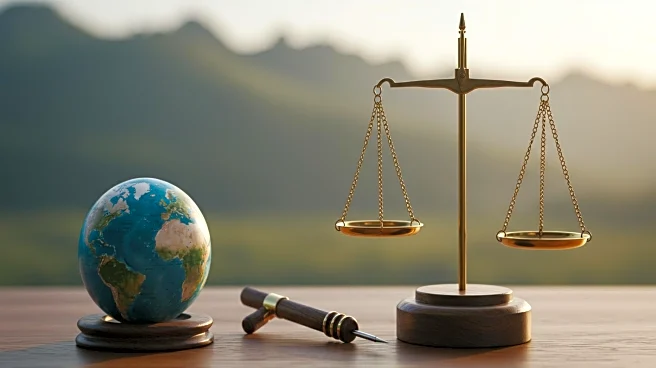What's Happening?
The International Court of Justice (ICJ) has issued a significant ruling on the legal responsibilities of states to address climate change. The ruling calls for 'deep, rapid and sustained reductions' in emissions and opens the possibility for climate reparations lawsuits. This decision is considered a landmark in international law, interpreting climate inaction as a human rights violation and an infringement of international law. Although the ruling is advisory and nonbinding, it is seen as an authoritative interpretation that could influence both international and national courts. The ruling warns that failure to take appropriate action against greenhouse gas emissions may constitute an internationally wrongful act, potentially leading to lawsuits against countries, including the United States.
Why It's Important?
The ICJ's ruling could have far-reaching implications for global climate governance and legal landscapes. It provides nations and activists with a powerful tool to advance climate lawsuits, potentially leading to increased legal actions against countries and companies. This could result in significant economic impacts, particularly for industries reliant on fossil fuels. The ruling may also influence national court decisions, shaping domestic policies and potentially leading to higher energy costs. The decision highlights the growing legal pressure on governments and businesses to address climate change, emphasizing the need for comprehensive climate policies.
What's Next?
The ruling is expected to trigger a surge in climate-related lawsuits worldwide, with activists and nations using the ICJ's decision to push for stricter climate policies. Companies, especially those in the fossil fuel industry, may face increased legal challenges, particularly in regions like Europe where courts have already begun to enforce harsher climate policies. The United States, despite its withdrawal from the Paris Agreement, could also be targeted for failing to meet the legal standards set by the ruling. This development may lead to a reevaluation of climate strategies by governments and businesses to mitigate legal risks.
Beyond the Headlines
The ruling raises ethical and legal questions about the balance between climate action and other human needs such as food, healthcare, and education. It challenges the notion that fossil fuels are solely detrimental, acknowledging their role in global progress. The decision may prompt discussions on the most effective ways to improve human welfare while addressing climate concerns, potentially influencing future policy decisions.











